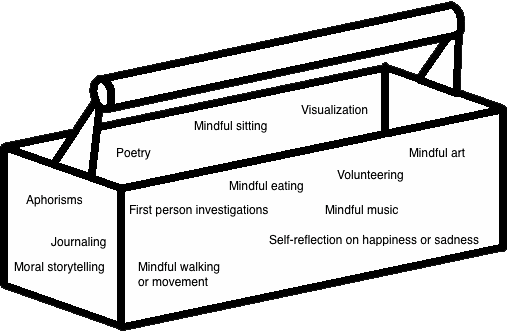What’s in Your Mindfulness Toolbox

What’s in Your Mindfulness Toolbox? The Nuts and Bolts of Stress Relieving Activities
Mindfulness is one of the new buzzwords in our culture. Time Magazine recently dedicated an entire issue to educating its readers on what exactly it is. Jon Kabat Zinn has even developed a program around it called Mindfulness Based Stress Reduction. This all begs the question: what in the world is this phenomenon about? Moreover, why should I begin a mindfulness practice? Let’s explore the reasons why having an arsenal of weapons to combat stress should be on everyone’s to do list.
The role of stress
So, what exactly is stress? Stress can be defined as a state of mental or emotional strain or tension resulting from adverse or very demanding circumstances. We all experience stress differently, and some of us handle it a bit better than others. It is important to figure out what stress looks like when it shows up in our lives so we can identify not only stress itself, but also what triggers precipitate stress in our lives. Stress manifests itself in many ways, predominantly physical, behavioral, and emotional ways. Some important questions to ask ourselves are where we feel stress in our body, what signs our bodies give us that we are experiencing stress, and what healthy coping skills we utilize to alleviate stress. This is where mindfulness becomes our greatest tool in the quest to ameliorate tension and anxiety.
Benefits and Putting into Practice
Jon Kabat Zinn writes that “the awareness that emerges through paying attention on purpose, in the present moment, and nonjudgmentally to the unfolding of experience moment by moment” constitutes mindfulness. Perhaps it can be conceptualized as moment to moment awareness that requires attention, intention, and attitude. It is not a religious practice, though for many who practice it, becomes an abundantly rich, sacred, and spiritual practice. The psychological benefits of mindfulness include reduced rumination—that dwelling on negative thoughts to which we so often fall victim, stress reduction, increased focus, less emotional reactivity, and most importantly, better cognitive flexibility, which is crucial in our cultivation of empathy. Mindfulness has even been shown to have health benefits like increased immune function and decreased pain.
Holistic Benefits
There are also holistic benefits; meditation has not only been shown to support the development of creativity and enhance the development of skills needed for interpersonal relationships, but it may also help in the nurturing of self-compassion. Check out the Toolbox of Mindfulness Activities below for ideas and inspiration around developing your own practice.

It is not necessary to commit to engaging in each activity in order to flex your mindfulness muscle! Pick one or two activities that truly appeal to you and go from there. It’s not about being a ‘good student’ of the practice, but rather it’s about creating a practice that you enjoy, one that works for you, and one that aids in mitigating your levels of stress. Mindfulness has become the new buzzword because, as studies have shown, IT WORKS. If you are interested in learning how to incorporate mindfulness into your daily life, contact us here.
***Photo courtesy of Andrew Wolff via Unsplash
